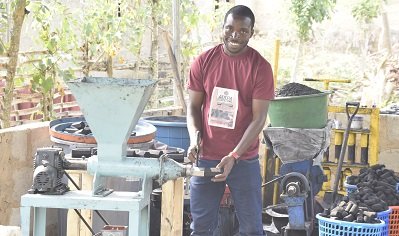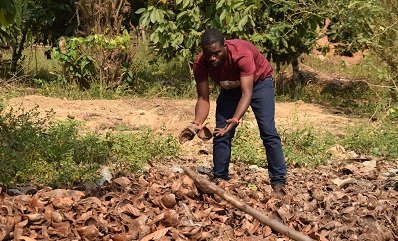Hot!
Ernest Twum Barima makes coconut husk, plastic waste valuable

Realising the extent of waste pollution in his vicinity and the country at large, he thought of alternative ways to make good use the situation. He ended up creating a job for himself and a few others.
Here is Mr Ernest Twum Barima, the young university graduate, whose company produces smokeless and long-lasting charcoal briquettes from coconut husk.

The product, targeted at households and institutions, continues to earn positive review and commendation as the manufacturer intends to scale up production to meet local and international demand.
Business
Ernest is a graduate of Koforidua Technical University (KTU) and Valley View University. He studied Purchasing and Supply at KTU before proceeding to Valley View where he obtained Bachelor of Education (B.Ed.) and Information Technology in Education Management.
He conceived the business idea while studying at Valley View University and decided to roll it out after many attempts to secure a job.
Throughout his educational journey, he had dreamt of establishing his own company and it is, therefore, not surprising that he has surmounted the hurdle.
Currently based at Kyebi-Afiesa in the Eastern Region, the venture known as Adepafie Market Company Limited, began when he procured and distributed 100 pieces of waste bins to encourage responsible waste disposal.
As time went by, he noticed the volume of waste generated daily by coconut vendors in his area and decided to conduct studies into unconventional uses of the discarded coconut husk.
“After I discovered other uses of the coconut husk, I gave empty sacks to the coconut sellers and asked them to offload the husks at my house at the end of every business day.
“My family initially could not come to terms with why I was turning our house into a dumpsite for coconut husk and even thought I had lost my mind,” he told The Spectator.
Unperturbed by these unsavoury comments, however, Ernest kept fine-tuning his idea until 2019, when he produced the first batch of charcoal briquettes to be used at home.
Community members, impressed with the outcome, subsequently encouraged him to start producing for commercial use.
Challenges
According to the initiator, steps towards commercialisation was challenging as he sought financial and technical assistance from some private entities but they failed to deliver on their promise after series of engagement with them.
Undauntedly, he relied on personal savings and the support of family and friends to get his idea off the ground. And with barely a year into his business, he has employed six people who are supporting him presently.
Apart from making charcoal briquettes, Ernest again recycles plastic waste into pavement bricks which, he said, could be a substitute for concrete blocks used in road construction.
Production process
Explaining the making of the charcoal briquettes, he said “the coconut husk is allowed to dry and later burnt and crushed into powder. The powder is then compacted with an organic binder, extruded and moulded into desired shapes and finally left to harden.”
He said he used to go through these processes manually but had now been able to build a makeshift machine which enables him to produce faster.
“I could produce only two bags of charcoal briquette in three days when there was no machine, but I am now able to produce about 10 bags in a day. The quality has improved and it is currently in high demand,” he said.
The charcoal briquette is packed in paper bags, made from plantain stem, and sold at GH 3.00 per Kilo.
The Chief Executive Officer says he has intended to reduce the price in future and has encouraged traditional charcoal producers to adopt his approach and stop cutting trees for charcoal production.
Future
In spite of the progress made, Ernest continues to fall on the support of family and friends to fund his operations.
“I could not meet the requests of my clients previously but I can now meet their need within a month with the little machine I use at the moment.
“I receive a lot of orders from across the country and if I get the needed support to expand production I know things would get better,” he noted.
The mini factory for the charcoal briquette, he said, was situated on a piece of family land, and he would require modern machines and vehicles to convey raw materials to help speed up production.
Although the company makes some profit, Ernest says the income generated goes into repayment of loans he has secured from family and friends.
With the required support, he intends to set up a bigger factory in Accra and Kumasi and employ more youth, should he get the needed support.
By Ernest Nutsugah
Hot!
Is the “Rev” title biblical?

In many Ghanaian churches, pastors are often introduced as “Reverend” or simply “Rev.”
The title is seen as a mark of respect, yet its biblical basis continues to stir debate.
While some Christians argue that it is a harmless way to honour church leaders, others insist it is unbiblical and should not be used at all.
Those who question the title usually point to the Bible itself. Nowhere in Scripture did Jesus or the apostles use “Reverend” for themselves or for one another.
Instead, they addressed each other as “brother” or “servant.” In Matthew 23, Jesus even warned his followers not to seek titles such as “rabbi” or “father,” teaching that all believers are equal under one God.
Critics also note that Psalm 111:9 describes God’s name alone as “holy and reverend” in the King James Bible.
To them, this means the word should be reserved for God, not for human beings. Others go further, citing Job 32, which cautions against giving flattering titles to men.
For such voices, the modern use of “Reverend” risks elevating pastors beyond what the Bible prescribes.
On the other hand, defenders of the title argue that it is not meant to replace God’s reverence but simply to acknowledge a minister’s role.
In many churches, “Reverend” is given to ordained ministers who have undergone training, much like the way a doctor is addressed as “Dr.”
The Bible itself, they point out, encourages believers to honour their leaders, with 1 Timothy 5:17 stating that elders who direct the affairs of the church well are “worthy of double honour.”
In this sense, the title is seen as a formal courtesy rather than a theological statement.
Supporters remind critics that Christianity does not operate in a vacuum but within cultural settings.
In Ghanaian society, respect for elders and authority is central to social order. Just as chiefs are addressed with titles such as “Nana” or “Togbe,” many Christians believe it is fitting to extend a similar courtesy to church leaders.
In their view, calling a pastor “Reverend” reflects Ghanaian values of honour and respect, and does not amount to worshipping a human being.
Yet the debate is far from settled. Some argue that the title has been abused, with individuals presenting themselves as “Reverend” without any proper training or accountability.
Calls have even been made for the regulation of church titles to prevent confusion and protect the credibility of ministry. Others, however, see no harm in its continued use, so long as it is not taken beyond what Scripture allows.
At the heart of the matter lies a bigger question: should Christians stick strictly to biblical language when addressing their leaders, or is it acceptable to adapt titles as society evolves?
The conversation is not just theological but cultural, touching on how Ghana balances respect for tradition with the authority of Scripture.
The debate over the “Rev” title is therefore not one with easy answers. What is clear, however, is that it forces us to reflect on how we show honour, how we interpret the Bible, and how faith interacts with our cultural practices.
As the discussion continues in church pews and on social platforms, we ask you: should pastors and ministers be called “Reverend,” or should Christians abandon the title altogether?
By: Jacob Aggrey
Hot!
Police confirm arrest of two suspects in Asankrangwa murder case

The Western Central Regional Police Command has confirmed the arrest of two men in connection with the fatal stabbing of a 20-year-old man at the Asankrangwa Education Area on Sunday, August 17, 2025.
In a statement signed by the Head of the Public Affairs Unit, ASP Beatrice Turkson, the police said preliminary investigations revealed that the deceased was chased and stabbed multiple times by a group of people.
The incident is believed to have stemmed from a misunderstanding between the deceased and one of the suspects, identified as 36-year-old Kwasi Opong.
According to the police, swift action led to the arrest of Opong and another suspect, 23-year-old William Francis Osei. Both are currently in custody assisting with investigations, while efforts are underway to apprehend another suspect who is still on the run.
The police noted that the body of the deceased has been deposited at the Asankrangwa Catholic Hospital morgue for preservation and autopsy.
“The Command assures the public that all persons connected to this heinous crime will be brought to justice,” the statement said.
The police appealed to the public to provide any information that could assist in the ongoing investigations.
By: Jacob Aggrey






